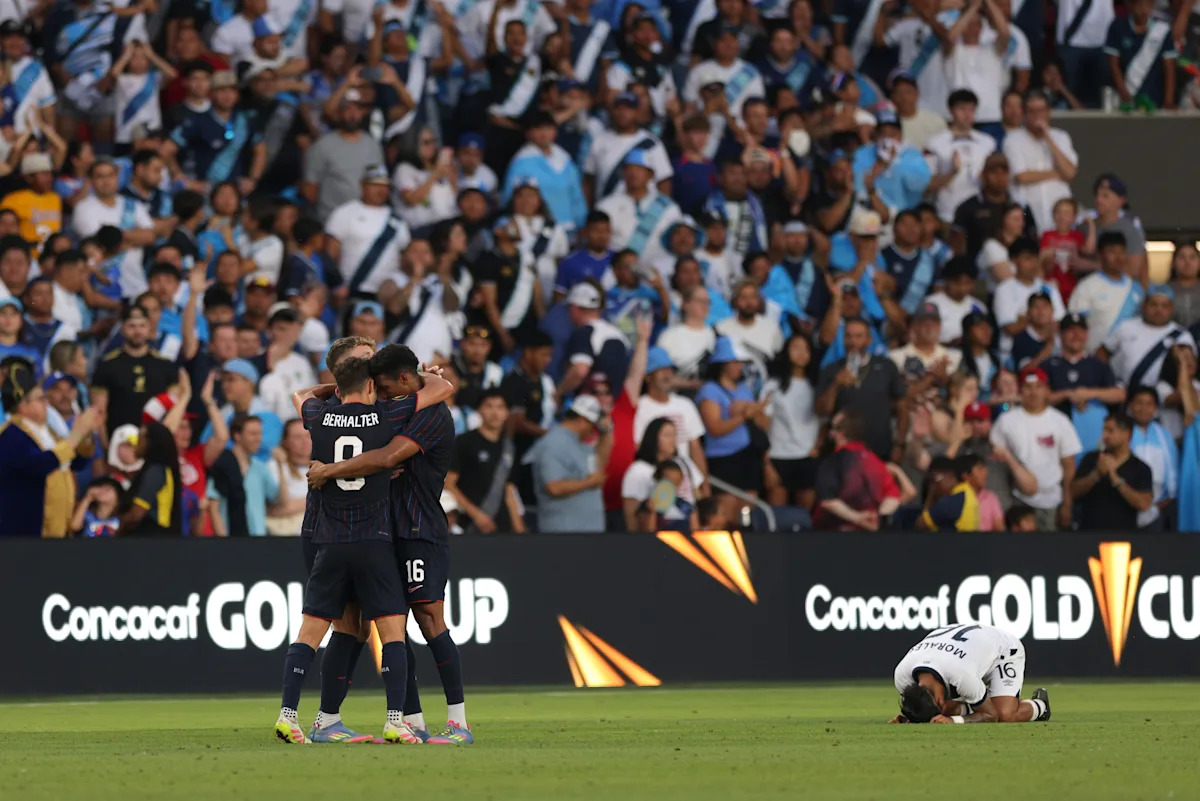St. Louis – The focus was on creating moments of chance, yet Mauricio Pochettino aimed to discuss football culture.
Following the US men’s national team’s 2-1 victory over Guatemala in the Gold Cup semi-finals, Pochettino expressed his admiration for the “incredible” Guatemalan fans he encountered.
He spoke passionately for nearly three minutes about what American football could gain from this experience, emphasizing how energy translates on the pitch. The atmosphere in the Energy Park was electric, impacting even the outmatched Guatemalan players, who presented a formidable challenge to the USMNT.
“I saw a Guatemalan player in tears,” Pochettino noted after the match. He later used this moment to congratulate the player and illustrate his point about emotional investment.
“That’s the way we need to feel,” he declared. “Our fans should feel the same way. It’s not just about enjoying the experience. If you lose, emotions will run high; things will resonate.”
The thrill of victory against Guatemala amidst passionate support. (Photo: John Dorton/ISI Photos/ussf/Getty Images)
(John Dorton/ISI Photos/ussf via Getty Images)
Pochettino, hailing from Argentina, shared how football’s intensity varies in different cultures. “In Argentina, losing isn’t just a minor setback; the repercussions are profound,” he explained. This sentiment resonates in Spain, France, and the UK, where he spent 30 years as a player and coach before taking over as head coach of the USMNT last fall. “Win or lose, the stakes are far greater,” he reiterated during a post-match press conference.
This perspective underscores a cultural shift he faces in the U.S., where the players might lack the same fervor prevalent in South and Central America. “In many places, you play to survive, to earn your meals and maintain pride,” Pochettino stated. “It’s not about fun; it’s about necessity.”
“Once this squad starts to embody that drive, I believe significant improvements will follow.”
While he did not suggest his players would treat a win casually, many have grown in a sports culture where football isn’t a means of survival; it’s often a recreational activity starting in middle-class suburbs. As talented kids move to academies with hopes of turning professional, they may lack the level of “desperation,” a term Pochettino used, that’s ingrained in cultures where football can alter lives.
This dynamic has been reinforced by fans who demand passion and energy. Before the match, the stadium filled steadily, culminating in an electric atmosphere where chants like “Supuede!” or “Yes, you can!” resonated loudly.
“The energy the fans brought was incredible,” Pochettino remarked.
USMNT’s Diego Luna celebrates in front of passionate Guatemalan fans in St. Louis. (Photo: Bill Barrett/ISI Photos/ussf/Getty Images)
(via Bill Barrett/ISI Photos/ussf Getty Images)
Veteran defender Tim Ream acknowledged this energy, noting it propelled the Guatemalan team to vigorous efforts.
“That’s football,” Pochettino affirmed, repeating the phrase for emphasis. “It’s soccer. It’s soccer.”
He highlighted the vital “connection between fans and teams,” expressing his desire to witness such synergy at the World Cup. During his tenure with the USMNT, he has observed lackluster stadiums, and even in filled venues, the atmosphere often feels subdued or artificial. This discrepancy has likely surprised him and sometimes seemed hard to comprehend.
What he hadn’t anticipated was the intensity of a true home game atmosphere until witnessing it on Wednesday.
“It felt just like playing in Guatemala,” Pochettino reflected. “The atmosphere was astonishing and had a tangible impact on the game.”
“We cannot underestimate what a spirited crowd can do to young players unaccustomed to it,” Ream remarked, noting that the pressure from fans can create a deafening noise and overwhelm players.
As several teammates pointed out, Pochettino should have foreseen this; it’s indicative of reality in the U.S., a country rich with immigrants from football-loving Latin American countries.
“We’re a nation of immigrants,” defender Chris Richards noted. “What we experienced tonight is a glimpse of that.”
Pochettino’s surprise did not go unnoticed, with Richards suggesting, “He’s still getting acquainted with the US landscape and wasn’t prepared for that.”
Ream echoed this sentiment, mentioning how some younger players were taken aback. He described the match as an invaluable “learning experience” ahead of Sunday’s final against Mexico in Houston. “Tonight’s match will serve as a precursor for the US-Mexico encounter,” Richards said, equipping the players with mental fortitude for the challenge ahead.
However, Pochettino remained uncertain about how his squad would respond to such an environment. He longed for his team to embody the same passion and fervor as the Guatemalan players exhibited.
“The great teams and nations don’t merely play a game,” Pochettino pointed out. “Today, football transcends a sport; it’s about something deeper. It’s about emotion.”
This is the ethos he hopes to cultivate in the US. However, such a cultural shift takes time, especially in a nation abundant with wealth and opportunities across various sports. But where does one begin?
“Winning can contribute, but players like midfielders Diego Luna and Malik Tillman can also usher this change. Unity and effort foster connections with our fans,” Ream concluded, suggesting this collaboration could elevate the culture of U.S. soccer.
Editorial Opinion: This insight highlights a crucial turning point for American soccer, as Pochettino emphasizes the need for emotional investment and fan connection, pivotal elements that can foster a fierce competitive spirit. For soccer fans, this shift could mean a brighter future for the sport in the U.S., unlocking the potential to rival soccer-crazy nations by cultivating an authentic football culture.



